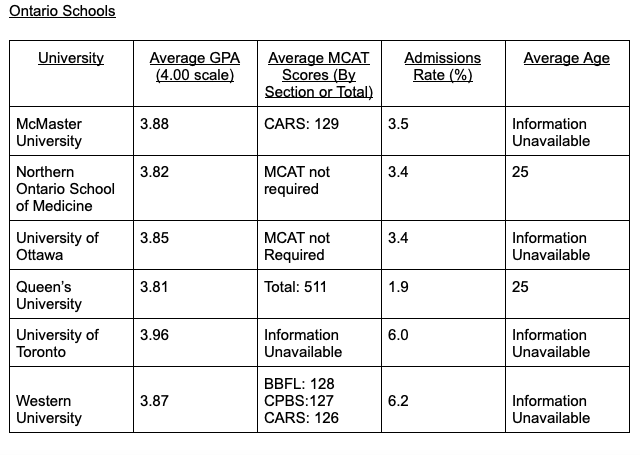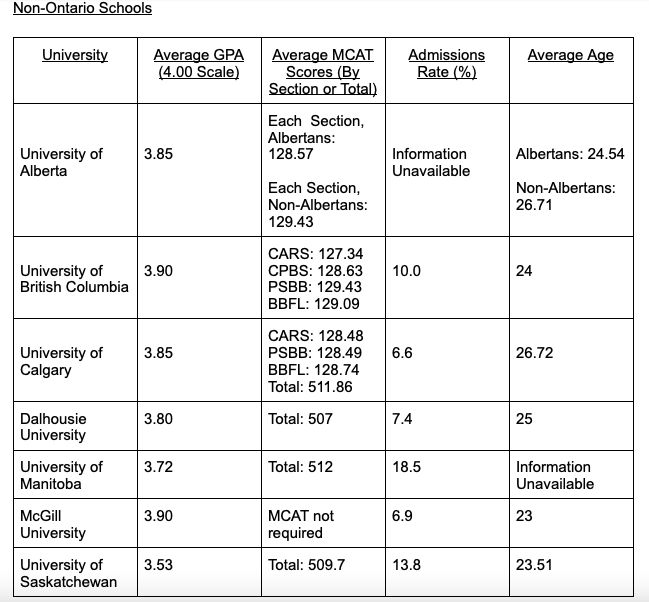OMSAS – the Ontario Medical School Application Service – opens in the first week of July, which means it’s medical school application season!
In order to gain admission into medical school, you need a sure-fire strategy that considers how you compare to each school’s ideal candidate profile. To help you start developing your strategy, we’ve assembled the most recent Canadian medical school admissions statistics. The following tables include the average GPA, MCAT score, and age of the successful candidates for each program as well as their admissions rate.
Understanding what kinds of applicants are successful in gaining admission will allow you to…
- Recognize the strengths that make you a competitive applicant
- Identify the medical programs at which you have the best chance of gaining admission
- Identify potential gaps and weak spots in your application
With this information, you can begin developing a plan that emphasizes your strengths and addresses your weaknesses. Keep in mind that there’s no “one size fits all” strategy. Everyone’s path to success will look a little different, based on what they need to work on, in order to have the greatest chance of admission.
Let’s take a look at the types of applicants Canadian medical schools are seeking. Once we’ve gone over these statistics, we’ll discuss what you can do as part of your action plan to ensure your profile will align with what the schools want to see.
Admission Statistics


With these statistics in mind, it’s time to put an action plan together and boost your chances of admission!
Your Action Plan
If your MCAT scores aren’t competitive, you can start your plan by retaking the exam to improve them. There are many test dates throughout the summer, giving you plenty of opportunity to retake the MCAT. In order to better retain information and ensure you review all of the relevant content before your test date, we encourage you to use active study methods and prepare a study schedule. Check out our blog post on the MCAT to make sure you’re preparing for it in the most effective way!
If your MCAT scores aren’t one of your weaknesses, use your time to improve upon the written components of the application. Medical schools are on the lookout for candidates who reflect the CanMEDS roles – a set of seven qualities that make a competent physician. Your autobiographical sketches and any supplemental essay questions should be written in a manner that authentically tells your story while highlighting the CanMEDS roles that you embody.
If you are short on experiences or skills that align with the CanMEDS roles, you still have several months before your applications are due to identify and pursue relevant opportunities in your community or school. If you can’t find any, consider launching your own initiative. This demonstrates strong leadership and initiative skills which will bolster your application and make you stand out from other applicants. It’ll also be of benefit to your personal and professional development.
It’s also crucial to carefully consider your references when composing your strategy! Medical schools usually ask for the contact information of 3 references and require that you provide a combination of personal, academic, and professional references in order to fully evaluate your background and skill set. Referees may have to provide their reference in the form of…
- Reference letters
- Phone calls
- Confidential Assessment Forms
Take special care when selecting your referees. They need to know you well enough to give an enthusiastic, first-hand recap of your skills and competencies. Trying to figure out how and when to approach your references? Check out our blog post on the topic!
Interview
Medical schools use interviews to identify candidates who can communicate clearly and effectively. The most commonly used interview format is the Multiple Mini Interview (MMI), in which candidates rotate through a number of stations and have to respond or react to the question or scenario posed at each station. While the specific amount of time at each station may differ from interview to interview, candidates are typically given between 8 and 12 minutes per station.
MMI questions are usually based around modern medical ethical issues. One way to prepare is by familiarizing yourself with some of the ethical issues, such as those included in the American Medical Association’s journal of ethics. The next step is to practice, practice, practice!
A great way of practicing on your own is to record yourself responding to sample questions and then watch the footage. Take note of your body language, number of filler words, and how long it takes you to respond to each question. You can also ask a friend or family member to interview you and give you feedback at the end of each question.
Looking for additional information on interview formats and sample questions? You can read all about them in our blog post on the subject.
***
Looking for support with your medical school application journey? Check out our application support and interview preparation services! We can even help you create a long-term plan that includes the experiences and skill development opportunities that will build your profile early on.
With industry experts on our team and 20+ years of experience, we’re ready to create a unique strategy that will give you the greatest chance of success and help you develop the confidence necessary to tackle the application process.
Good luck! The I Got In team is rooting for you.

